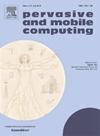基于可穿戴传感器的多活动场景下多镜头类增量步态识别的增强混合原型
IF 3.5
3区 计算机科学
Q2 COMPUTER SCIENCE, INFORMATION SYSTEMS
引用次数: 0
摘要
步态信息传感可穿戴设备为身份识别提供了可靠、鲁棒的解决方案。然而,在现实应用中,基于这些传感设备的步态识别系统应该适应不同的步行活动,解决个人数据有限的挑战,并不断更新以识别新老用户。在这项研究中,我们提出了一个基于混合原型增强的框架来解决多活动场景下的少镜头类增量步态识别(FC-GRMA)的挑战。首先,通过引入辅助活动标签生成混合原型,使其具有比普通原型更强的泛化性;其次,通过选择性原型增强模块对原型进行调整,提高了原型的代表性和判别能力;最后,在公共数据集USC-HAD和自建数据集ctut - ag上的验证表明,我们提出的框架在解决FC-GRMA问题上表现最好。特别地,我们还讨论了不同活动数量对模型性能的影响,结果表明我们的框架有效地解决了多活动场景下的灾难性遗忘问题。源代码可从https://github.com/lc321/fc-grma.git获得。本文章由计算机程序翻译,如有差异,请以英文原文为准。
Enhanced hybrid prototype for few-shot class-incremental gait recognition in multi-activity scenarios using wearable sensors
Wearable devices for gait information sensing provide a reliable and robust solution for identity recognition. However, in real-world applications, gait recognition systems based on these sensing devices should adapt to diverse walking activities, tackle the challenge of limited individual data, and continuously update to recognize both old and new users. In this study, we propose a framework based on hybrid prototype enhancement to address the challenge of few-shot class-incremental gait recognition in multi-activity scenarios (FC-GRMA). Firstly, hybrid prototypes are generated by introducing auxiliary activity labels, which are more generalizable than ordinary prototypes; secondly, the prototypes are adjusted by a selective prototype enhancement module, which improves the representative and discriminative abilities of the prototypes. Finally, validation on the public dataset USC-HAD and the self-built dataset CDUT-AG shows that our proposed framework performs best in solving the FC-GRMA problem. In particular, we also discuss the effect of different numbers of activities on the model performance, and the results show that our framework effectively addresses the issue of catastrophic forgetting in multi-activity scenarios. The source code is available at https://github.com/lc321/fc-grma.git.
求助全文
通过发布文献求助,成功后即可免费获取论文全文。
去求助
来源期刊

Pervasive and Mobile Computing
COMPUTER SCIENCE, INFORMATION SYSTEMS-TELECOMMUNICATIONS
CiteScore
7.70
自引率
2.30%
发文量
80
审稿时长
68 days
期刊介绍:
As envisioned by Mark Weiser as early as 1991, pervasive computing systems and services have truly become integral parts of our daily lives. Tremendous developments in a multitude of technologies ranging from personalized and embedded smart devices (e.g., smartphones, sensors, wearables, IoTs, etc.) to ubiquitous connectivity, via a variety of wireless mobile communications and cognitive networking infrastructures, to advanced computing techniques (including edge, fog and cloud) and user-friendly middleware services and platforms have significantly contributed to the unprecedented advances in pervasive and mobile computing. Cutting-edge applications and paradigms have evolved, such as cyber-physical systems and smart environments (e.g., smart city, smart energy, smart transportation, smart healthcare, etc.) that also involve human in the loop through social interactions and participatory and/or mobile crowd sensing, for example. The goal of pervasive computing systems is to improve human experience and quality of life, without explicit awareness of the underlying communications and computing technologies.
The Pervasive and Mobile Computing Journal (PMC) is a high-impact, peer-reviewed technical journal that publishes high-quality scientific articles spanning theory and practice, and covering all aspects of pervasive and mobile computing and systems.
 求助内容:
求助内容: 应助结果提醒方式:
应助结果提醒方式:


